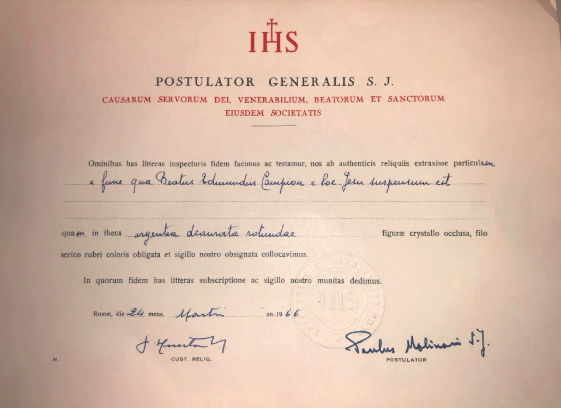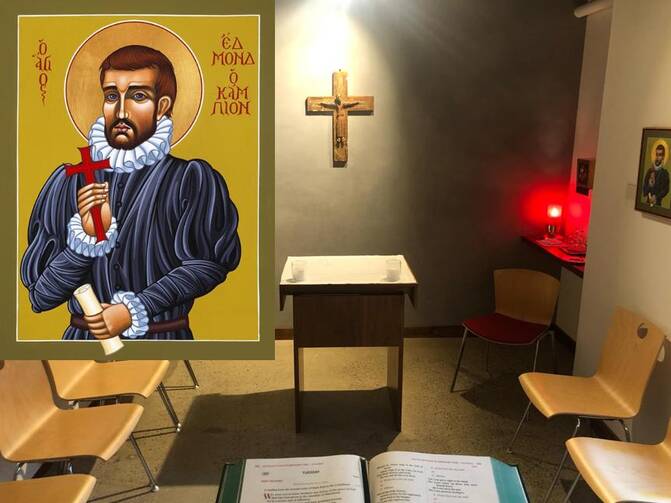Writers have a lot of patron saints. It is perhaps fitting for a profession where prayers for heaven-sent inspiration are a bit more pleading than elsewhere, but between Francis de Sales, Teresa of Ávila, Augustine, Jerome, Thérèse of Lisieux and more, we have several choices when it comes time to ask for saintly intercession. At America we have a Jesuit patron, the 16th-century English martyr Edmund Campion, S.J.
Campion is an obvious choice after one reads his life story (one option? Evelyn’s Waugh’s 1935 biography of him). A talented teacher and playwright at Oxford University, Campion so impressed Queen Elizabeth with his scholarship and rhetorical skill that she brought him to serve at court. He was later ordained a deacon in the Church of England; however, his study of the church fathers eventually convinced him to become Catholic—and then leave England to join the Jesuit novitiate in Prague.
He returned several years later to serve the Catholic community in defiance of England’s draconian anti-Catholic laws. “Campion became the archetype of the radical underground priest, sometimes literally: on the run, hidden under disguises, changing names, hiding in ‘priest holes’ in the homes of wealthy benefactors,” wrote America poetry editor Joe Hoover, S.J., in 2016. “Eventually, he was captured, tried, found guilty of treason and hanged, drawn, quartered. As always happens, his murder by the state made him even more of a hero and succor to the oppressed English Catholic remnant.”
During his ministry, the priest became known for “Campion’s Brag,” a defense of his intentions as spiritual and religious, not political. Among its famous lines:
[B]e it known to you that we have made a league—all the Jesuits in the world, whose succession and multitude must overreach all the practice of England—cheerfully to carry the cross you shall lay upon us, and never to despair your recovery, while we have a man left to enjoy your Tyburn, or to be racked with your torments, or consumed with your prisons. The expense is reckoned, the enterprise is begun; it is of God; it cannot be withstood. So the faith was planted: So it must be restored.
“While it is ‘Campion’s brag’ that the saint is best known for, today maybe it is Campion’s turn that can be most relevant for us. His wit, charm and skill took him to great heights, to the very seat of royal power,” Hoover wrote. “But then those same gifts led him to a place where, in good conscience, he could not serve the queen. He left his place of power for a different kind of power, one that eventually cost him everything. He didn’t have to abandon his skills, charm, oratory, he just had to fix them on someplace different.”
We have a chapel in the office—one of the perks of working here along with free Diet Coke—where Mass is said every Tuesday by one of our Jesuit priests on staff. It too is named in honor of St. Edmund Campion, and last week we happened across an interesting document when doing some housekeeping: a certificate confirming the authenticity of the relic of Campion that is sealed within our chapel altar.
The original is in Latin. I am to blame for any errors in translation, as it has been many years since I knew where my Wheelock was:
We give our word and testify to all who will inspect these letters that we have extracted from authentic relics a little piece from the rope by which Blessed Campion from the Society of Jesus was hanged, which we placed in a silver-gilt case of round shape, closed with crystal, bound with red silk thread, and sealed with our seal.
In whose trust we have given these letters with our signature and seal as security. Rome, the 24th day of March in the year 1966.
[unknown signature], keeper of relics Paolo Molinari, S.J., Postulator
Old-timers might recognize the name of the Jesuit who signed the certificate: Paul Molinari, S.J., was the postulator general for the Society of Jesus for over 50 years. He also worked at the Congregation for the Causes of Saints with his fellow Jesuit Kurt Peter Gumpel, S.J., on hundreds of different causes for sainthood over the decades.

In 1965, Molinari published Saints: Their Place in the Church. Reviewing it for America, Paul Dent, S.J., called it “a profoundly penetrating and comprehensive work. In scholarly, orderly fashion the saints are shown to be enduringly important, even to modern civilization…No other volume has made such a personally, socially, ecumenically and liturgically important part of Catholic theology as the ‘place’ of the saints in the Church so abundantly clear.”
In 1990, Kenneth L. Woodward published a more accessible account with Making Saints: How The Catholic Church Determines Who Becomes A Saint, Who Doesn’t, And Why. The religion editor for Newsweek from 1964 until 2002, Woodward conducted a number of interviews with Fathers Gumpel and Molinari for his book. “They were a perfect team,” Woodward remembered in a 2022 article for America. “Father Molinari was the polished Mr. Outside: a gregarious world traveler and familiar face at fine Roman restaurants. Father Gumpel was a chain-smoking Mr. Inside who preferred to work in the rooms where he lived and maintained his own storeroom stuffed floor to ceiling with documents and manuscripts.”
Both men would have been involved in the cause for sainthood of, yes, Edmund Campion. Note that in the document referenced above, he is “Blessed Campion,” not “Saint Campion”: He would not be named a saint until 1970, when Pope Paul VI canonized him.
America has honored many men and women of letters over the years with its Campion Award, but 2010’s honoree had a background of no small irony for any fan of the martyred saint: Archbishop Rowan Williams, the archbishop of Canterbury. How did the ceremonial head of the worldwide Anglican communion address the thorny issue of the namesake of his new honor? With tact and grace:
And so, in very gratefully and humbly accepting this generous award, I would want to join with you all in celebrating the fact that “pardon’s the word to all,” the fact that man and woman are more than this or that, and the fact that in our hearts God has placed his image, which means the capacity for reconciliation and the capacity for utter and radical gift. That gift, that compassion, that readiness for risk, we love and acknowledge and celebrate in saints like Edmund Campion.
•••
Our poetry selection for this week is “Catalog of Cures in Ordinary Time,” by Aileen Cassinetto. Readers can view all of America’s published poems here.
Members of the Catholic Book Club: We are taking a hiatus while we retool the Catholic Book Club and pick a new selection.
In this space every week, America features reviews of and literary commentary on one particular writer or group of writers (both new and old; our archives span more than a century), as well as poetry and other offerings from America Media. We hope this will give us a chance to provide you with more in-depth coverage of our literary offerings. It also allows us to alert digital subscribers to some of our online content that doesn’t make it into our newsletters.
Other recent Catholic Book Club columns:
Walter Brueggemann: A scholar of the prophets—and a prophetic voice
David Tracy was more than a theologian
The priest-detectives of American fiction
Riley Hughes, an unsung literary jack of all trades
The history (and future) of covering conclaves
Happy reading!
James T. Keane








